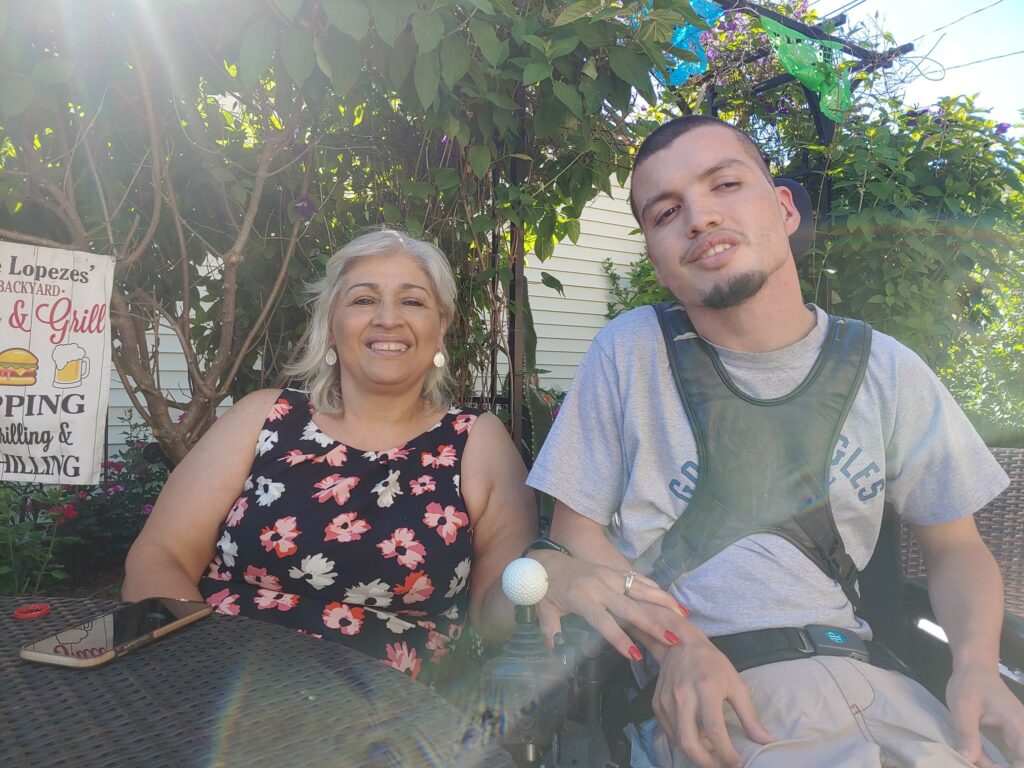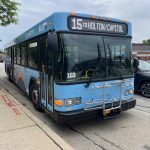Will High Court Prevent Disabled From Voting?
People who can’t use hands or feet can’t cast absentee ballot unassisted, as lower court ruling requires.

Monica Lopez and her son Ivan view voting as a civic obligation and have worries about a case pending in the Wisconsin Supreme Court. The 30-year-old man gets around on a motorized wheelchair because he cannot use his hand or feet to accomplish things without assistance. (Photo by O. Ricardo Pimentel)
Disability rights activists in Wisconsin are concerned that a case before the Wisconsin Supreme Court will disenfranchise voters who cannot cast their ballots unassisted.
In past elections, voters with certain disabilities that prevented them from physically dropping off their own ballots into drop boxes could be assisted in doing that, typically by family members or caregivers. But a lower court ruling in January said voters must deliver their own ballots.
The case is now before the Wisconsin Supreme Court, with a ruling expected by the end of June or early July.
Under the current ruling, cities and towns around Wisconsin cannot use ballot drop boxes, and people casting absentee ballots in the state must cast their own ballot unassisted.
Disability rights activists say the ruling will deter and prevent voters with certain disabilities from casting their ballots.
Barbara Beckert, director of the Milwaukee office of Disability Rights Wisconsin, a nonprofit that advocates for people with disabilities in the state, said the rules present a barrier for those with disabilities who cannot use their hands or feet.
“Many people with disabilities and older adults have to rely on someone else to help them with this,” Beckert said. “This will make it difficult if not impossible to return that ballot for them.”
Luke Berg, deputy counsel at the Wisconsin Institute for Law and Liberty, the conservative legal group that’s suing for these rules changes, said that state law is not being followed by the Wisconsin Election Commission. The commission’s enforcement of rules has been inadequate, he said, as it issues guidance on voting operations but none of the guidance is binding.
Berg said there are exceptions in state law that allow different options for people with disabilities.
“If there’s a gap, that needs to be addressed by the Legislature,” Berg said. “It doesn’t warrant changing the rule for everyone statewide. That shouldn’t be the solution.”
Voters with disabilities worried
Ivan Israel Lopez, 30, has been voting since he was 18. He was born with cerebral palsy and his speaking abilities are limited, as is his mobility. He gets around on a motorized wheelchair because he cannot use his hand or feet to accomplish things without assistance.
Like voting.
In past elections, his father, Francisco Lopez Sr., helped the South Side resident, actually taking him to the polls, helping him sign his “x” to a form and then doing whatever needed to be done for Ivan to vote.
But the elder Lopez died in August 2020. And now his mother, Monica Lopez, who has been active in advocating for people with special needs, fears her son will be unable to vote. She’s unsure if she will be able to get him to the polls.
So they tried to fill out a form requesting an absentee ballot, but Monica Lopez said they had difficulty understanding how to complete it.
Now that voters must personally deliver an absentee ballot, she is unsure if even that avenue is available to her son.
“Maybe he’s not going to vote unless they give him assistance,” Monica Lopez said, as Ivan listened and nodded his head. “Although he knows his rights, he needs help” to vote.
Monica Lopez explained, as she held up a soft drink with a straw for Ivan to sip, that she and her husband instilled in all five of their children the importance of voting.
“All of my kids, first thing after they turned 18, we taught them to know their right to vote,” she said. “It is not only our right, it is our obligation.”
Monica Lopez is the former president and a current board member of Alianza Latino Aplicando Soluciones, or ALAS, which translates in English to Latino Alliance Applying Solutions.
William Crowley, 35, is a self-professed “diehard” voter. The East Side resident participates in every election he can. In previous years, he would use an absentee ballot and have someone else drop it in the mailbox for him — a necessity, since he can’t do it himself.
Crowley also is a supervising attorney with Disability Rights Wisconsin. He uses a motorized wheelchair to get around.
In April, Crowley decided he didn’t want to risk his vote being discounted — after Wisconsin’s courts prohibited voters from having someone else deliver their ballot and stopped use of ballot drop boxes — so he went to his polling place to vote in person.
When he arrived, however, the wheelchair lift at the polling place wasn’t working. Workers at the polling place were able to bring his ballot curbside and allow him to vote that way, but it would have been a lot simpler to have someone help him mail it from home.
“I just want to have my voice heard in how things are run,” Crowley said. “Particularly when you get down to the local level, your vote really does matter with such slim margins. It could really affect not just my own life but the lives of many people.”
Patrick Gill, a 54-year-old who lives near North 86th Street and West Bradley Road, can’t write on his own. His arms shake too much. A brain injury sustained 10 years ago has made it difficult to control his limbs. Gill also uses a wheelchair.
“My mind is still there,” Gill said. “I just need help writing.”
Gill said he tries to remain politically informed and likes to stay involved in the community. He thinks people should be able to assist disabled voters with their ballots.
“Every vote counts,” he said.
Resources you can use
The Disability Rights Wisconsin hotline can be reached at 844-347-8683.
Beckert encourages people with disabilities to reach out to their municipal clerk now and ask for disability accommodations.
That information can be found on the My Voter Info page of MyVote Wisconsin’s website. In Milwaukee, the executive director of the Election Commission is Claire Woodall-Vogg. Her office can be reached at 414-286-3491 or emailed at voterinfo@milwaukee.gov It is located in City Hall, 200 E. Wells St., Room 501.
Brian Peters, independent living services assistant program director with Independence First, a disability care organization in the city, encouraged voters with disabilities to follow the Wisconsin Disability Vote Coalition to get updates on the situation.
Advocates for voters with disabilities express angst over case that’s before Wisconsin Supreme Court was originally published by Milwaukee Neighborhood News Service






















It was a bedrock principle of society to protect the vulnerable. WILL has always taken the stance that this is not important. Those who are medically at risk had to deal with the anti-vaccers and the elimination of mask requirements which resulted in this population having an increasing vulnerability of getting covid and dying. Now keeping these persons from voting is the next part of their campaign against these persons.
This is unbelievable, that citizens with disabilities that make it necessary for someone to help them complete the ballot will be denied the right to vote. And this isn’t just about those who are currently disabled and affected by these actions. It’s also about all those, including everyone reading this and more, who may at some point in the future become disabled. Whatever your current situation, we’re all in this together.
This is unbelievable…that voters who need assistance to fill out and/or enter their ballots in the machine will not be able to vote. What’s next…no help if you’re blind? Or have a severe learning disability and can’t read the ballot on your own? And this isn’t just about those who are currently unable to vote without assistance. This is about everyone…any of us may at some point in the future be disabled and need assistance with voting. We’re all in this together.